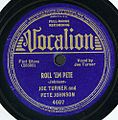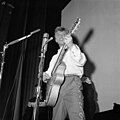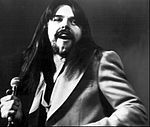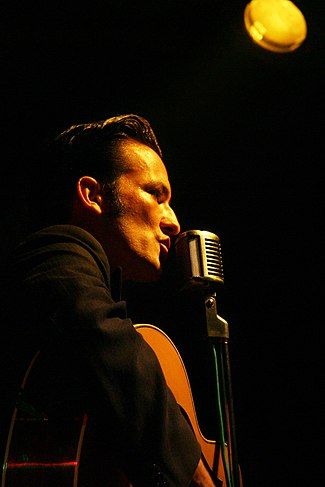Portal:Rock music
The Rock Music Portal
Rock is a broad genre of popular music that originated as "rock and roll" in the United States in the late 1940s and early 1950s, developing into a range of different styles from the mid-1960s, particularly in the United States and the United Kingdom. It has its roots in rock and roll, a style that drew directly from the genres of blues, rhythm and blues, and country music. Rock also drew strongly from genres such as electric blues and folk, and incorporated influences from jazz and other musical styles. For instrumentation, rock is typically centered on the electric guitar, usually as part of a rock group with electric bass guitar, drums, and one or more singers. Usually, rock is song-based music with a 4
4 time signature and utilizing a verse–chorus form, but the genre has become extremely diverse. Like pop music, lyrics often stress romantic love but also address a wide variety of other themes that are frequently social or political. Rock was the most popular genre of music in the U.S. and much of the Western world from the 1950s to the 2010s.
Rock musicians in the mid-1960s began to advance the album ahead of the single as the dominant form of recorded music expression and consumption, with the Beatles at the forefront of this development. Their contributions lent the genre a cultural legitimacy in the mainstream and initiated a rock-informed album era in the music industry for the next several decades. By the late 1960s "classic rock" period, a few distinct rock music subgenres had emerged, including hybrids like blues rock, folk rock, country rock, Southern rock, raga rock, and jazz rock, which contributed to the development of psychedelic rock, influenced by the countercultural psychedelic and hippie scene. New genres that emerged included progressive rock, which extended artistic elements, heavy metal, which emphasized an aggressive thick sound, and glam rock, which highlighted showmanship and visual style. In the second half of the 1970s, punk rock reacted by producing stripped-down, energetic social and political critiques. Punk was an influence in the 1980s on new wave, post-punk and eventually alternative rock.
From the 1990s, alternative rock began to dominate rock music and break into the mainstream in the form of grunge, Britpop, and indie rock. Further fusion subgenres have since emerged, including pop-punk, electronic rock, rap rock, and rap metal. Some movements were conscious attempts to revisit rock's history, including the garage rock/post-punk revival in the 2000s. Since the 2010s, rock has lost its position as the pre-eminent popular music genre in world culture, but remains commercially successful. The increased influence of hip-hop and electronic dance music can be seen in rock music, notably in the techno-pop scene of the early 2010s and the pop-punk-hip-hop revival of the 2020s. (Full article...)
General images -
Selected article
The band spent its first four years signed to the independent record label Fat Wreck Chords, on which they released two studio albums, The Unraveling (2001) and Revolutions per Minute (2003). Both the albums were met with underground success, and in 2003 the band signed with the major label Dreamworks, which was absorbed by Geffen. Rise Against's major label debut Siren Song of the Counter Culture (2004) brought the band mainstream success, largely in part to the popularity of the singles "Give It All" and "Swing Life Away". The band's next album, The Sufferer & the Witness (2006), peaked at number ten on the Billboard 200 in the United States, and was Rise Against's first album to chart in countries outside of North America.
With the release of Appeal to Reason (2008), Rise Against's music shifted toward a more accessible and radio-friendly sound, with greater emphasis on production value. The album's third single, "Savior", broke the record for the most consecutive weeks spent on both the Hot Rock Songs and Alternative Songs charts. Rise Against's popularity grew with the release of Endgame (2011), which peaked at number two on the Billboard 200, and charted highly worldwide. The band's seventh and eighth albums, The Black Market (2014) and Wolves (2017) continued the trend of commercial success, and both peaked with the top ten on the Billboard 200. Their ninth and most recent album, Nowhere Generation, was released in 2021.
Rise Against is also known for their advocacy of progressivism, supporting organizations such as Amnesty International and the It Gets Better Project. The band actively promotes animal rights and most of the members are straight edge, PETA supporters and vegetarians. (Full article...)
Selected biography
A roots rock musician known for his raspy, powerful voice, Seger is one of the best-known artists of the heartland rock genre, with his songs often concerning love, women, and blue-collar themes. He has recorded many hits, including "Night Moves", "Turn the Page", "Mainstreet", "Still the Same", "Hollywood Nights", "Against the Wind", "You'll Accomp'ny Me", "Shame on the Moon", "Roll Me Away", "Like a Rock", and "Shakedown", the last of which was written for the 1987 film Beverly Hills Cop II and topped the Billboard Hot 100 chart. He also co-wrote the Eagles' number-one hit "Heartache Tonight", and his recording of "Old Time Rock and Roll" was named one of the Songs of the Century in 2001.
With a career spanning six decades, Seger has sold over 75 million records worldwide, making him one of the world's best-selling artists of all time. Seger was inducted into the Rock and Roll Hall of Fame in 2004 and the Songwriters Hall of Fame in 2012. Seger was named Billboard's 2015 Legend of Live honoree at the 12th annual Billboard Touring Conference & Awards, held November 18–19 at the Roosevelt Hotel in New York. His farewell tour took place in 2018 and 2019. (Full article...)
Selected album
The untitled fourth studio album by the English rock band Led Zeppelin, commonly known as Led Zeppelin IV, was released on 8 November 1971 by Atlantic Records. Produced by the band's guitarist, Jimmy Page, it was recorded between December 1970 and February 1971, mostly in the country house Headley Grange. The album contains the band's most well-known recording, the eight-minute-long "Stairway to Heaven".
The informal recording environment inspired the band, allowing them to try different arrangements of material and create songs in various styles. After the band's previous album Led Zeppelin III (1970) received lukewarm reviews from critics, they decided their fourth album would officially be untitled and represented instead by four symbols – one chosen by each band member – without featuring the name or any other details on the cover. Unlike the prior two albums, the band was joined by guest musicians: the singer Sandy Denny on "The Battle of Evermore", and the pianist Ian Stewart on "Rock and Roll". As with prior albums, most of the material was written by the band, though there was one cover song, a hard rock re-interpretation of the Memphis Minnie blues song "When the Levee Breaks".
The album was a critical and commercial success and is Led Zeppelin's best-selling album, having shipped over 37 million copies worldwide. It is one of the best-selling albums in the United States and of all time, while critics have regularly placed it high on lists of the greatest albums of all time. (Full article...)
Selected song
"City of Blinding Lights" is a song by Irish rock band U2. It is the fifth track on their eleventh studio album, How to Dismantle an Atomic Bomb (2004), and was released as the album's fourth single on 6 June 2005. It was produced by Flood, with additional production by Chris Thomas and Jacknife Lee. The song reached number one in Spain, and peaked in the top ten in Canada, Ireland, the United Kingdom, and several other countries. The music video was shot at the General Motors Place in Vancouver, British Columbia, Canada.
The earliest incarnation of the song was developed during sessions for the band's 1997 album, Pop. The lyrics were written by the band's lead vocalist Bono, taking partial inspiration from his recollection of his first trip to London, and from the band's experience playing in New York City in the aftermath of the September 11 attacks during their Elevation Tour in 2001. Other lyrics refer to Bono's relationship with his wife Ali. The song's underlying theme reflects lost innocence and was inspired by an image Bono saw of himself from the early 1980s. The sound has been compared to the tone of U2's 1984 album, The Unforgettable Fire and their 1987 single "Where the Streets Have No Name".
"City of Blinding Lights" was well received by critics and won a Grammy Award for Best Rock Song at the 2006 ceremony. The song made its live debut on the group's 2005–2006 Vertigo Tour, when it was commonly played as the opening song. It has been performed at nearly every show from a U2 concert tour since. The track has been used in episodes of The Simpsons and Entourage, and in the film The Devil Wears Prada. Former U.S. President Barack Obama used the song at his campaign events during the 2008 and 2012 U.S. presidential elections, and listed it as one of his favourite songs; U2 performed it at his 2009 inaugural celebration at the Lincoln Memorial; and the song was used as Obama's entrance music for his acceptance speeches at the Democratic National Conventions of 2008 and 2012, as well as the speeches he delivered at the conventions of 2016 and 2024. (Full article...)
Selected picture
Did you know (auto-generated)

- ... that raw material waste from the West influenced a generation of rock music in China?
- ... that Rolling Stone listed Ácido Argentino as the most essential album of Argentine heavy metal?
- ... that the heavy metal band Cradle of Filth released a T-shirt that was so offensive that several people were arrested for wearing it?
- ... that before charting on the UK Albums Chart with Are We There Yet?, the indie rock musician James Marriott had made a career of mocking other YouTubers' music?
- ... that Skálmöld & Sinfóníuhljómsveit Íslands documents a symphony orchestra playing heavy metal music?
- ... that the British rock musician Hannah Grae went viral online with an anti-sexual harassment parody of Aqua's "Barbie Girl"?
Selected genre
Garage rock (sometimes called garage punk or '60s punk) is a raw and energetic style of rock music that flourished in the mid-1960s, most notably in the United States and Canada, and has experienced a series of subsequent revivals. The style is characterized by basic chord structures played on electric guitars and other instruments, sometimes distorted through a fuzzbox, as well as often unsophisticated and occasionally aggressive lyrics and delivery. Its name derives from the perception that groups were often made up of young amateurs who rehearsed in the family garage, although many were professional. (Full article...)
Selected audio
Related portals
WikiProjects
Things you can do
Expand: College rock, Electronic rock, Pop rock
Clean Up: Instrumental rock, Rap rock, New wave, Industrial rock, Progressive metal, Southern rock, Folk rock, Funk rock, Space rock
Add Sources: Pagan rock
Join one of the many WikiProjects pertaining to Rock music.
News
No recent news
More articles -

Rock Steady is the fifth studio album by American rock band No Doubt, released on December 11, 2001, by Interscope Records. The band began writing the album with initial recording sessions in Los Angeles and San Francisco, then traveled to London and Jamaica to work with various performers, songwriters, and producers. Sly & Robbie, the Neptunes, and William Orbit were among the many artists the band collaborated with on the album.
As a result of these collaborations, Rock Steady touches on many musical styles, focusing on electropop, dancehall, and new wave. The band attempted to capture the vibe of Jamaican dancehall music, and experimented with writing songs without its standard instrumentation. Lead vocalist Gwen Stefani wrote her lyrics quickly in comparison to previous records, and dealt with topics ranging from partying to ruminations on her relationship with Gavin Rossdale. (Full article...)
More did you know...
- ... that David Bowie's first gig as lead singer was at the Green Man, Blackheath?
- ... that Carlton le Willows Academy alumni include cricketer Mark Footitt, Air Supply singer/guitarist Graham Russell, and balloonist Janet Folkes?
- ... that the video for Marilyn Manson's soft-rock ballad "Running to the Edge of the World" was widely condemned for its depiction of violence against women?
- ... that Susan Beschta was a punk rocker and federal judge?

- ... that the FM Non-Duplication Rule adopted by the FCC 60 years ago led to the creation of the album-oriented and classic rock radio formats?
- ... that The Elvis Dead, a retelling of Evil Dead II in the style of Elvis Presley, features songs such as "Standing in a State of Shock", "I've Been Possessed", and "Wrapped Up in Vines"?
Major topics
Subcategories
Associated Wikimedia
The following Wikimedia Foundation sister projects provide more on this subject:
-
Commons
Free media repository -
Wikibooks
Free textbooks and manuals -
Wikidata
Free knowledge base -
Wikinews
Free-content news -
Wikiquote
Collection of quotations -
Wikisource
Free-content library -
Wikiversity
Free learning tools -
Wikivoyage
Free travel guide -
Wiktionary
Dictionary and thesaurus















































